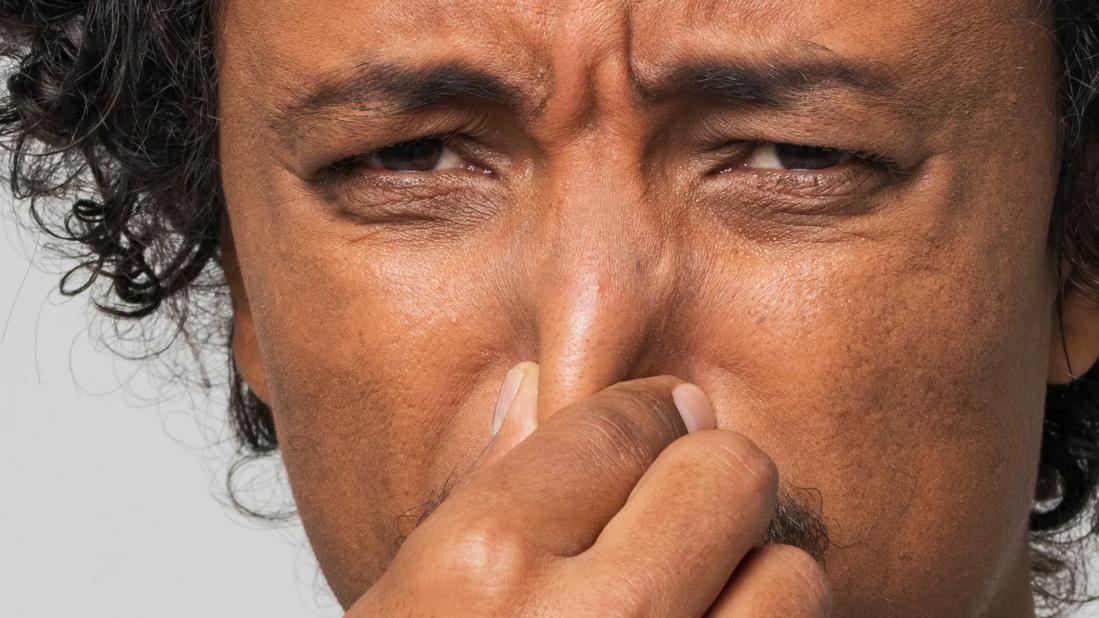Better hygiene and medical treatment for STIs, yeast or bacterial infections can help address foul-smelling genitals

Have you ever noticed an unpleasant odor lingering around your genitals? If you have, you’re certainly not alone. A smelly penis is a common concern with a variety of causes that range from an over-production of sweat to bacterial infections and more. Although a smelly penis could be uncomfortable and embarrassing in some scenarios, there are ways to manage it.
Advertisement
Cleveland Clinic is a non-profit academic medical center. Advertising on our site helps support our mission. We do not endorse non-Cleveland Clinic products or services. Policy
Urologist Petar Bajic, MD, runs through some helpful solutions and provides examples of when a bad odor could be a sign of a more serious issue.
When sweat from your apocrine glands mixes with the natural bacteria living on your skin, it produces a musky body odor. “Males have more apocrine glands in their genital region, so the musk scent is stronger there,” says Dr. Bajic.
Your genetics, age and even the foods you eat can also affect the way your body smells. So, your natural scent will likely differ from the natural body odors of other people. But when it comes to foul or offensive penile odors, many other factors may be involved.
“A foul or fishy smell may indicate a need to clean your genitals better,” says Dr. Bajic. “Or it could be a sign of infection or some other underlying medical condition.”
Here are some common causes for a smelly penis.
Your genitals may smell like sour milk because sweat, oil, dead skin cells and grime can cause bacteria to break down into aromatic compounds that smell bad. If this happens, you may just need to be better at washing your penis.
You can do this by lathering a clean washcloth (or your hands) with soap and warm water and washing your penis and genital area every day and after sexual intercourse. Dr. Bajic also recommends choosing underwear made with breathable, moisture-wicking material and loose-fitting pants or shorts that help with air circulation.
Advertisement
Poor hygiene can also lead to a foul-smelling cheese-like substance called smegma. This combination of oils, skin cells, sweat and other fluid can build up around the head of your penis or underneath your foreskin if you haven’t had a circumcision. “Because smegma is moist, it’s the perfect breeding environment for bacteria,” explains Dr. Bajic. “The bacterial growth causes the foul smell.”
To remove smegma, gently pull back your foreskin to clean underneath it or use a washcloth and warm water to gently clean around the head of your penis.
Trichomoniasis (trich) is one of several sexually transmitted infections (STIs) that can cause a smelly penis. Symptoms include a smelly, froth-like penile discharge, itchy genitals and a burning sensation when you pee or ejaculate. Other STIs like chlamydia and gonorrhea can cause a foul-smelling discharge, while genital herpes and syphilis can cause sores on the penis that smell bad.
Treatments for STIs vary depending on the cause. Antibiotics treat trich, chlamydia and gonorrhea. Antiviral medications treat herpes. For prevention, participate in safe sex practices like wearing condoms to lower your risk of getting an STI or spreading an infection to others.
A penile yeast infection occurs when Candida albicans (a fungus found on your skin, mouth and intestines) grows out of control underneath your foreskin or on the head of your penis. You can also get this infection from having sexual intercourse with someone who has a yeast infection.
With this infection, you may develop a thick, white, foul-smelling discharge. You may also experience burning or itching around your genitals or reddened painful inflammation (balanitis) on the head of your penis if you’re uncircumcised. “If you take antibiotics or have a weakened immune system due to diabetes or other conditions, you’re also more at risk for these kinds of infections,” shares Dr. Bajic.
Treating a penile yeast infection involves using an over-the-counter or prescription topical and oral antifungal medication. You apply creams or lotions directly to the affected skin areas and take the oral medications as prescribed.
There are multiple different kinds of bacteria that can cause infections in your penis. For example, you can get an infection from having vaginal sex with an infected person (bacterial vaginosis) or from an open sore or penis piercing. A fishy smell tends to be a sign of a bacterial infection, but other symptoms include:
Advertisement
A more serious but rare type of bacterial infection — Fournier’s gangrene — can eat away at the flesh of your penis, scrotum or perineum (the area between your genitals and rectum). With Fournier’s gangrene, you’ll notice a putrid smell coming from your penis and may also experience:
“Fournier’s gangrene is a life-threatening condition that requires immediate medical attention,” stresses Dr. Bajic.
Treating bacterial infections requires antibiotics, but Fournier’s gangrene typically requires more intensive treatment like surgery.
Penile cancer can also cause a foul-smelling liquid to form underneath foreskin or the head of your penis. You may also have lumps, sores or growths, as well as balanitis. Healthcare providers perform biopsies to diagnose penile cancer and treatments depend on the size of the tumor and whether the cancer has spread (metastasis).
“Although penile cancer is pretty rare, keep an eye out for skin changes involving the head of the penis (glans), foreskin or penile shaft, especially redness or solid nodules,” advises Dr. Bajic. “These could be a sign of penile cancer. Penile cancer is also more common in uncircumcised men.”
Advertisement
Penises come in all shapes, sizes and, yes, even smells. You know your scent best. If you experience other symptoms or the smell of your penis concerns you, make an appointment to see a healthcare provider.
“Contact your provider if a penile odor persists after washing or you have sores or other unusual symptoms,” says Dr. Bajic. “It’s important to find out the cause of the odor so we can get you the right treatment.”
Advertisement

Sign up for our Health Essentials emails for expert guidance on nutrition, fitness, sleep, skin care and more.
Learn more about our editorial process.
Advertisement

See your urologist if pain is persistent or severe

A variety of factors can cause temporary or more lasting changes in penis length

Bathing once a day is the general guidance, but you could also have reasons to soap up twice a day or not at all

An unexplained lump, swelling, discomfort or changes to your testicles shouldn’t be ignored

Arousal without orgasm can be uncomfortable, but it’s no reason to pressure sexual interactions

The list includes eating a healthier diet, managing your weight and reducing stress

Adjusting your diet to focus on plant-based, whole foods may improve erectile function

Here’s what you need to know about ED, which most men experience to some degree during their lives

Even small moments of time outdoors can help reduce stress, boost mood and restore a sense of calm

A correct prescription helps your eyes see clearly — but as natural changes occur, you may need stronger or different eyeglasses

Both are medical emergencies, but they are very distinct events with different causes